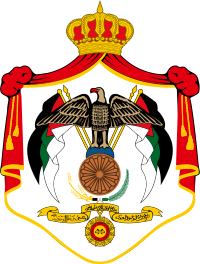
The politics of Jordan takes place in a framework of a parliamentary monarchy, whereby the Prime Minister of Jordan is head of government, and of a multi-party system. Jordan is a constitutional monarchy based on the constitution promulgated on January 8, 1952. The king exercises his power through the government he appoints which is responsible before the Parliament. In contrast to most parliamentary monarchies, the monarchy of Jordan is not ceremonial, with the King having significant influence over the affairs of the country.

The Congress of the Republic of Colombia is the name given to Colombia's bicameral national legislature.

The Australian Electoral Commission (AEC) is the independent federal agency in charge of organising, conducting and supervising federal Australian elections, by-elections and referendums.

The Parliament of South Australia is the bicameral legislature of the Australian state of South Australia. It consists of the 47-seat House of Assembly and the 22-seat Legislative Council. General elections are held every 4 years, with all of the lower house and half of the upper house filled at each election. It follows a Westminster system of parliamentary government with the executive branch required to both sit in parliament and hold the confidence of the House of Assembly. The parliament is based at Parliament House on North Terrace in the state capital of Adelaide.

Elections in Barbados are held to choose members to fill elective offices in the House of Assembly. Elections are held on Election Day. These general elections do not have fixed dates, but must be called within five years of the opening of parliament following the last election. A former minister of the DLP, Warwick Franklin summed up the general elections process in Barbados as saying it is really just, "30 by-elections on the same day."

There are 39 multi-member electoral districts, known as Dáil constituencies, that elect 160 TDs, to Dáil Éireann, the house of representatives of the Oireachtas, Ireland's parliament, on the system of proportional representation by means of the single transferable vote (PR-STV), to a maximum term of five years.
An election commission is a body charged with overseeing the implementation of electioneering process of any country. The formal names of election commissions vary from jurisdiction to jurisdiction, and may be styled an electoral commission, a central or state election commission, an election board, an electoral council or an electoral court. Election commissions can be independent, mixed, judicial or executive. They may also be responsible for electoral boundary delimitation. In federations there may be a separate body for each subnational government. An election commission has a duty to ensure elections are conducted in an orderly manner.

The Election Commission of Pakistan is an independent, autonomous, permanent and constitutionally established federal body responsible for organizing and conducting elections to the national parliament, provincial legislatures, local governments, and the office of President of Pakistan, as well as the delimitation of constituencies and preparation of electoral rolls. As per the principles outlined in the Constitution of Pakistan, the Commission makes such arrangements as needed to ensure that the election is conducted honestly, justly, fairly and in accordance with law, and that corrupt practices are guarded against. The Election Commission was formed on 23 March 1956 and has been restructured and reformed several times throughout the history of Pakistan.

Zimbabwe Electoral Commission (ZEC) is an independent Chapter 12 institution established in terms of Section 238 of the Constitution of Zimbabwe; which is responsible for the management and administration of Zimbabwe's electoral processes. It was initially established by the act of Parliament in 2004, with influence from its predecessor, the Electoral Supervisory Commission as well as the Southern African Development Community.
Redistribution is the process by which electoral districts are added, removed, or otherwise changed. Redistribution is a form of boundary delimitation that changes electoral district boundaries, usually in response to periodic census results. Redistribution is required by law or constitution at least every decade in most representative democracy systems that use first-past-the-post or similar electoral systems to prevent geographic malapportionment. The act of manipulation of electoral districts to favour a candidate or party is called gerrymandering.

The Supreme Electoral Court of Costa Rica (TSE), is the supreme election commission of the Republic of Costa Rica. The Electoral Court was established in 1949 by the present Constitution of Costa Rica.

The Independent Electoral and Boundaries Commission (IEBC) is an independent regulatory agency that was founded in the year 2011 through the making of the Constitution of Kenya. The Commission is responsible for conducting or supervising referendums and elections to any elective body or office established by the Constitution, and any other elections as prescribed by an Act of Parliament. It was created in a provision of the 2010 constitution and the Independent Electoral and Boundaries Commission Act. Its mandate includes "the continuous registration of voters and revision of the voter's roll, the delimitation of constituencies and wards, the regulation of political parties process, the settlement of electoral disputes, the registration of candidates for elections, voter education, the facilitation of the observation, monitoring and evaluation of elections, the regulation of money spent by a candidate or party in respect of any election, the development of a code of conduct for candidates and parties, [and] the monitoring of compliance with legislation on nomination of candidates by parties."
The Independent Election Commission of Afghanistan (IEC) was the national electoral commission of Afghanistan, which was responsible for administering and supervising elections and referendums under the Constitution of Afghanistan.

The Central Electoral Commission of Armenia (CEC) organizes elections and referendums in Armenia. The Commission oversees and regulates the electoral process, counts and publicizes results, among other duties. Before the formation of the Republic of Armenia in 1991, the Central Electoral Committee activities were carried out in accordance with Soviet Armenian laws set by the Election of People's Deputies. Electoral reforms were adopted in August 2011 concerning the organizing and conducting of presidential and regional elections in Armenia, three levels of electoral committees were established.

The Election Commission of India (ECI) is a constitutional body. It was established by the Constitution of India to conduct and regulate elections in the country. Article 324 of the Constitution provides that the power of superintendence, direction, and control of elections to parliament, state legislatures, the office of the president of India, and the office of vice-president of India shall be vested in the election commission. Thus, the Election Commission is an all-India body in the sense that it is common to both the Central government and the state governments.

The Election Administration of Georgia is a permanent independent non-partisan body responsible for organizing national elections and referendums in Georgia in accordance with the Constitution of Georgia and the Electoral Code of Georgia.

The Electoral Act 1993 is an Act of the New Zealand Parliament for regulating elections in New Zealand. It "establishes the electoral agencies, electoral system, election processes, how MPs are replaced between elections, registration processes for political parties and logos, enrolment and electoral roll requirements, and provides for the Māori Electoral option, and the Representation Commission." One such agency is the Electoral Commission which is responsible, among other things, for the administration of parliamentary elections and referendums.
Delhi State Election Commission is an autonomous and statutory body constituted in Indian state of Delhi for ensuring that elections are conducted in free, fair and unbiased way. Constitution of India with provisions as per Article 243K and 243 ZA and Article 324 ensures creation and safeguarding of the powers of State Election Commissions. Delhi State Election Commission is responsible for conducting elections for Urban Local Bodies like Municipalities, Municipal Corporations, Panchayats and any other specified by Election Commission of India. Delhi State Election Commissioner is appointed by Lieutant Governor of Delhi.
The Azad Jammu & Kashmir Election Commission is an independent, autonomous, permanent and constitutionally established body responsible for organizing and conducting elections to the Azad Jammu and Kashmir Legislative Assembly, Kashmir council, local governments, and the office of President of Azad Kashmir, as well as the delimitation of constituencies and preparation of electoral rolls. In accordance with the principles set down in the Interim Constitution of AJK, the commission makes the necessary measures to guarantee that the election is conducted honestly, justly, fairly, and in compliance with the law, and that corrupt practices are prevented.















